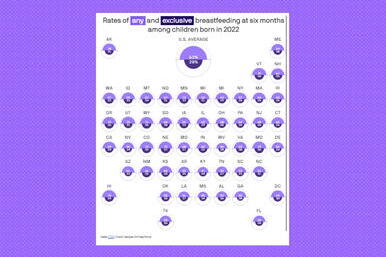Why exclusive breastfeeding isn't always "best"

There's no question that breast milk is the gold standard for infant nutrition, but the pressure to exclusively breastfeed can be crushing for new mothers.
Why it matters: Pediatric nutrition experts are clear that infant formula is safe, and it's essential if breastfeeding comes at the health expense of the mom.
By the numbers: Only 28% of babies born in 2022 were exclusively breastfed for six months, according to CDC data.
- 48% of babies were breastfed exclusively for three months.
- And 62% of babies got any breast milk at 6 months old.
Meanwhile, nearly 86% of babies born in 2022 in the U.S. were breastfed at some point — the highest rate recorded since the CDC began tracking the data in 2015.
- The numbers suggest a rise in "combo feeding," when babies are fed with both breast milk and formula.
Between the lines: Breastfeeding is natural but not easy.
- For the mom, it often comes with sore or bleeding nipples, difficulty getting a proper latch, the risk of clogged milk ducts, round-the-clock feedings during infant growth spurts, mood swings and intense hunger, endless cleaning and sterilizing of bottles and pumps, and feeling the weight of engorged breasts that can wake you up when you already have chronic sleep deprivation.
- There's also the concern of whether there's enough milk and nonstop calculations about supply and upcoming feeds. And that's assuming the mom and baby don't have other health limitations for breastfeeding.
"Breastfeeding was the hardest thing I have ever done in my life, both [emotionally] and physically," said one participant in a breastfeeding survey used in a UK Scientific Reports study published in April. "I was not prepared for how difficult it was."
- Other respondents found that breastfeeding difficulties threatened their identity as a mother. "I felt like I couldn't do what was best for my baby, like [a] failure," wrote another mom.
Reality check: Pressures to breastfeed are connected to mental health struggles including postpartum depression, additional studies have found.
- And those issues aren't just harmful for the mother. They can also have long-term impacts for the baby.
What we're hearing: "If it helps everyone's state of mind, I think it's better, in some ways [to use formula], than having a mom being stressed out and frayed at the edges, struggling and trying to meet impossible standards," says Sharon Donovan, a University of Illinois, Urbana-Champaign professor focused on pediatric nutrition.
- Yes, breastfeeding has definite health benefits — even combo feeding offers some immune protection for a child — but babies can also grow well and thrive on formula alone, which is "safe and effective," she says.
- Between the lines: Infant formula is meant to mimic breast milk. For example, seed oils are often used because they closely "match the fatty acid composition of breast milk," Donovan says.
The intrigue: Newer formulas even get closer to the composition of breast milk with extra ingredients like HMOs.
Carly's thought bubble: Breastfeeding has been a huge part of my life this past year — but only because I had every bit of luck and support on my side to make it work.
- Even with a baby who latched relatively quickly, a partner who washed pump parts and took turns with feeds, paid parental leave for both of us and a loyal dog curled up at my feet during nursing sessions, breastfeeding is still the first thing that comes to mind when someone asks, "What's been the hardest part of motherhood?"
- (Fun fact: I was formula-fed as a baby. I'm doing just fine.)
Bottom line: "Breast is best" loses its meaning when a mother's well-being is at risk.
What we're watching: The FDA panel behind Operation Stork Speed is reviewing infant formula standards. In a preprint, it calls formula "a healthy product" with "decades of successful use."